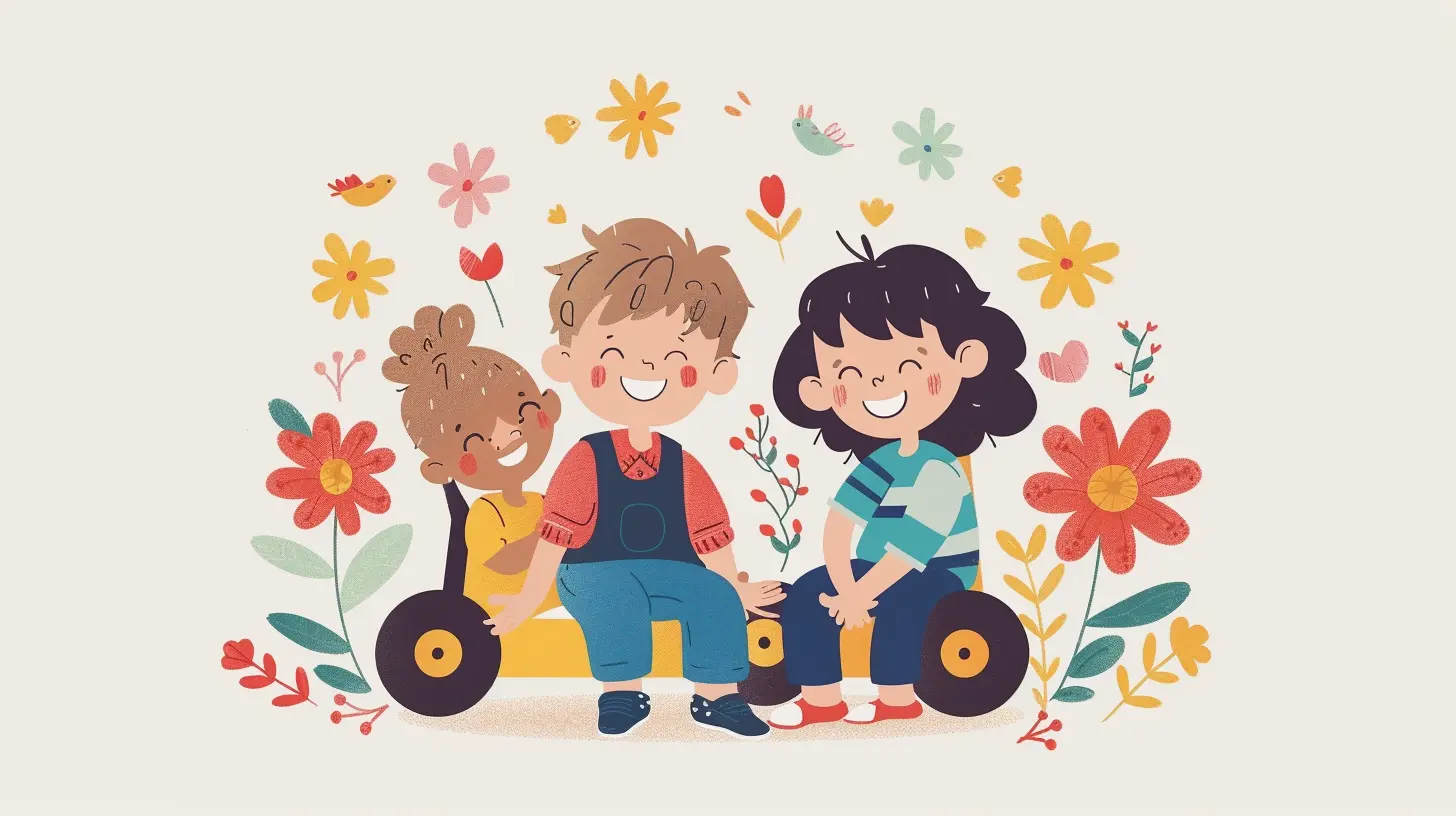How to Support Siblings of Children with Learning Disabilities
11 June 2025
When a child is diagnosed with a learning disability, the focus often shifts almost entirely to helping that child thrive. That’s understandable — they need specialized support, tailored strategies, and a whole lot of patience. But there’s another important part of the family equation that often gets overlooked: the siblings.
Yep, the brothers and sisters who quietly watch from the sidelines. The ones who often take on more responsibility, show more maturity than their age warrants, and sometimes carry emotions they don’t fully understand. So, how do we support them? How do we make sure their needs aren't lost in the shuffle?
Let’s break it down — in plain English, with a warm heart and a practical head.
Why Siblings Need Support Too
Imagine being a child and not quite understanding why your brother gets more attention. Or why your sister struggles with things you find easy. Or why mom and dad seem stressed a lot of the time.Siblings of children with learning disabilities grow up in what feels like a slightly different version of family life. And while every family is unique, there are some common threads:
- They may feel neglected or jealous.
- They might try too hard to be "the good kid" to avoid adding pressure.
- Confusion and guilt can swirl around them — especially if they don't fully understand their sibling's challenges.
- They may take on a caregiver role too early, sacrificing their own childhood.
These kids don’t need pity. They need understanding, space to express themselves, and a safe place where they don’t always have to be the strong ones.
Signs Your Child May Be Struggling
Kids don’t always come out and say, “I feel sad because my brother gets all the attention.” Wouldn’t that be nice? Instead, the signs show up in less obvious ways:- Acting out or withdrawing
- Trying too hard to be perfect
- Expressing anger in unrelated situations
- Declining performance in school or losing interest in hobbies
- Becoming overly responsible or anxious
If you spot any of these, don’t panic. It just means it’s time to check in and offer a little extra support.
1. Open the Lines of Communication
Start with something simple: talk. Not a big ol’ heart-to-heart that makes them squirm — just conversations woven into everyday moments. Car rides, bedtime, during a walk.Ask things like:
- “How are you feeling about everything with your sister?”
- “Is there anything about home that’s been hard for you?”
- “Do you ever feel like you want more time with me?”
Let them know it’s okay to feel all kinds of things — resentment, sadness, love, confusion, and even guilt. Emotions aren’t “good” or “bad.” They’re just signals. Like traffic lights guiding us on what to explore next.
And remember, listening is more important than fixing.
2. Encourage Their Individual Identity
Siblings sometimes feel like the "other child" – the one without the diagnosis, without the meetings with teachers, without the accommodations. It’s important to remind them they’re not defined by their sibling's disability.Celebrate who they are! Support their passions — whether they love soccer, guitar, or building LEGO empires. Give them space to shine in their own right.
Here’s a thought — create one-on-one time with each child weekly. Even 30 minutes of undivided attention can be magic. Grab ice cream, take a walk, or just chill and watch a show together.
3. Include Them in the Conversation, But Don’t Overload Them
Knowledge is power — even for kids. Avoid keeping your child in the dark about their sibling’s learning disability. Instead, give age-appropriate explanations that help them understand what’s going on.Try saying things like:
- “Your brother’s brain works a bit differently, so he needs help in certain areas.”
- “It’s not anyone’s fault, and it just means he learns in his own way.”
- “You know how you’re good at puzzles and he’s great at drawing? Everyone has strengths and struggles.”
This helps put things in perspective without making them feel like they have to become little therapists or mini-adults.
4. Normalize a Full Range of Emotions
Let’s get real. Even kids raised in the most loving homes will sometimes feel things they’re not proud of. Maybe they get angry because their sibling takes longer to do things, or embarrassed by a public meltdown. That’s normal.Encourage your child to talk about their feelings. It helps to model it yourself, saying things like:
- “Sometimes it’s hard for me too, and I get frustrated.”
- “It’s okay to feel jealous or even annoyed sometimes. You’re a human being.”
When emotions are out in the open, they stop brewing in the dark.
5. Connect Them with Other Siblings
There’s something comforting about realizing you’re not the only one. If your child can talk with other siblings going through the same thing, it can ease loneliness and create a sense of belonging.Look for:
- Local sibling support groups
- Online forums (with supervision for younger kids)
- Camps or programs for families of children with disabilities
These experiences can be incredibly healing — giving them a place to vent, laugh, and connect.
6. Balance Responsibilities at Home
Siblings often end up taking on more responsibilities — whether it’s helping with homework, keeping the peace, or comforting their brother or sister when things go sideways.While helping out is great, be careful not to lean too hard on them. Let them be kids, too.
You can say:
- “You’re not responsible for fixing things.”
- “It’s okay to focus on your own stuff sometimes.”
- “We’re a team, but it’s not all on your shoulders.”
Make sure chores and expectations are fair — and not based on guilt or pressure.
7. Get Professional Support When Needed
Sometimes, no matter how loving and supportive your home is, your child may still need extra help processing everything.There's no shame in bringing in a counselor or therapist. In fact, it can be a gift. Think of it like giving them a safe place to unpack their emotional backpack without worrying about judgment or hurting anyone's feelings.
Even just a few sessions can provide tools for coping, expressing themselves, and building resilience.
8. Celebrate the Family's Strengths
Let’s not forget: families dealing with learning disabilities are some of the most empathetic, patient, creative, and strong people out there. Yes, it's tough — but it can also bring siblings closer together and teach them incredible life lessons.Celebrate those wins.
- When your child sticks up for their sibling at school.
- When they choose kindness even when it’s hard.
- When they help explain things to friends.
Remind them that their love and support matter — a lot more than they realize.
9. Keep the Humor Alive
Laughter truly is the best medicine. Family life can be messy, unpredictable, and downright chaotic at times. But that doesn’t mean it can’t be joyful.Crack jokes. Have family dance parties. Watch hilarious movies together. Make silly memories. Lightness doesn’t mean ignoring the hard stuff — it just means choosing not to let it steal all the air in the room.
Humor builds bonds. It reminds us we're all in this together — imperfect, exhausted, but full of heart.
Final Thoughts: You’re Doing Better Than You Think
Supporting siblings of children with learning disabilities isn’t about getting it perfect. It’s about being present, paying attention, and showing up with as much love and honesty as you can muster.There will be days when you feel like you’re stretched too thin. Like you’re not giving anyone enough. Take a breath. You're human. And just by reading this? You’re already on the right track.
Your kids don’t need you to have all the answers. They just need to feel seen, heard, and loved for exactly who they are.
So the next time you're caught in the whirl of therapies, IEP meetings, and meltdowns — remember that quiet sibling standing nearby. Offer a smile. Pull them into your arms. And say, “Hey, how are you doing?”
That simple question might mean more than you’ll ever know.
all images in this post were generated using AI tools
Category:
Learning DisabilitiesAuthor:

Janet Conrad
Discussion
rate this article
2 comments
Dusk Good
Ah yes, because siblings of children with learning disabilities definitely have it easy. What a walk in the park!
June 15, 2025 at 2:27 PM

Janet Conrad
I appreciate your perspective! It’s true that siblings face unique challenges, and our aim is to provide support strategies for them as well.
Skylar Reyes
Thank you for this insightful article! Supporting siblings of children with learning disabilities is so crucial. Your tips offer valuable guidance for fostering understanding and empathy within families, ensuring everyone feels included and valued. Great work!
June 13, 2025 at 3:20 AM

Janet Conrad
Thank you so much for your kind words! I'm glad you found the article helpful in promoting understanding and inclusion within families.


